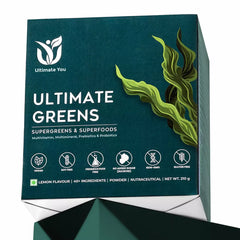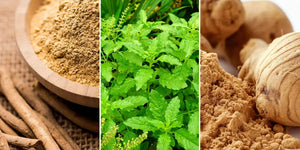The monsoon season is here — and while the rain brings cool breezes and cozy vibes, it also invites sniffles, sneezes, and sore throats. If you find yourself waking up with a scratchy throat or ending the day with a stubborn cough, you’re not alone. This is the season when your immune system could use a little extra love.
And what better way to give it that daily boost than with a warm, comforting cup of herbal tea? These teas aren’t just delicious — they’re packed with natural ingredients that help fight infections, reduce inflammation, and soothe your system.
Whether you’re starting your day, taking an afternoon break, or winding down before bed, a mug of herbal tea can be your daily dose of wellness.
Let’s explore the best herbal teas to keep colds away this monsoon and make rainy days a little healthier.
Scroll down to know more!
Comparison Chart: Best Herbal Teas for Monsoon Colds
1. Tulsi (Holy Basil) Tea
Tulsi, also known as holy basil, is a revered adaptogenic herb in Ayurveda, known for its powerful healing properties. It contains essential oils like eugenol, camphene, and cineole that have antibacterial, antifungal, and antiviral effects — making it a top choice to combat common cold symptoms during the monsoon.
Benefits
- Boosts overall immune function
- Reduces inflammation in the respiratory tract
- Acts as a natural expectorant to clear mucus
- Calms the nervous system and reduces stress-related immune suppression
How to prepare?
Boil 6–8 fresh tulsi leaves (or 1 tsp dried tulsi) in 1.5 cups of water for 5–7 minutes. Add a piece of ginger and a dash of honey for added immunity and flavor.
2. Ginger Tea
Ginger is loaded with gingerol — a bioactive compound with powerful anti-inflammatory and antioxidant properties. It helps alleviate throat pain, reduces nausea, and supports circulation, which is often sluggish during damp, rainy weather.
Benefits
- Reduces inflammation in the throat and sinuses
- Promotes better digestion and detoxification
- Fights bacterial and viral infections
- Eases chills and body aches associated with colds
How to prepare?
Slice a 1-inch piece of fresh ginger and boil in 2 cups of water for 10 minutes. Add a cinnamon stick and a pinch of black pepper for added heat and effectiveness.
3. Turmeric Tea (Golden Tea)
Turmeric is a staple in Indian households, and for good reason. Its active compound, curcumin, is known for its potent antioxidant and antimicrobial qualities. It not only helps fight infections but also supports female fertility and liver in detoxifying the body.
Benefits
- Fights inflammation and infections
- Supports liver detox during illness
- Enhances immune cell activity
- Soothes a sore throat and eases coughing
How to prepare?
Simmer ½ teaspoon of turmeric powder in 1½ cups of water or milk for 5–7 minutes. Add a pinch of black pepper (to enhance curcumin absorption) and a teaspoon of ghee or coconut oil for better bioavailability.
4. Peppermint Tea
Peppermint leaves contain menthol, a natural decongestant and muscle relaxant. When inhaled or consumed as tea, menthol opens nasal passages and makes breathing easier, offering instant relief from stuffy noses and sinus pressure.
Benefits
- Eases nasal congestion and headaches
- Relaxes throat muscles and soothes coughs
- Helps reduce fever through mild sweating
- Provides digestive relief if you’re feeling queasy
How to prepare?
Steep 1 tablespoon of fresh peppermint leaves (or 1 tsp dried) in hot water for 7–10 minutes. Inhale the steam while sipping slowly for maximum benefits.
5. Liquorice Root Tea
Liquorice root has demulcent properties, meaning it forms a soothing film over mucous membranes to relieve irritation. It’s excellent for dry, persistent coughs and throat discomfort. It also supports adrenal health, helping the body handle stress better.
Benefits
- Soothes sore throats and persistent coughs
- Acts as a natural anti-inflammatory
- Helps fight viral infections
- Supports adrenal and immune function during stress
How to prepare?
Add 1 tsp dried liquorice root to 1.5 cups of water and simmer for 10 minutes. Strain and drink warm. Limit to once daily if you have high blood pressure or are pregnant.
6. Lemongrass Tea
Lemongrass contains citral and limonene — compounds that have antioxidant and antimicrobial properties. This aromatic herb supports digestion, flushes toxins, and helps reduce fever and inflammation, making it a perfect rainy-day tea.
Benefits
- Detoxifies the body and supports digestion
- Reduces cold and flu symptoms like cough and fever
- Calms the mind and body
- Rich in antioxidants to boost immune defenses
How to prepare?
Chop 1 fresh lemongrass stalk or use 1 tsp dried lemongrass. Boil in 2 cups of water for 7–8 minutes. Add ginger or mint for added flavor and benefits.
7. Chamomile Tea
Chamomile is a gentle, floral tea well known for calming the mind and promoting sleep. While it doesn’t directly kill cold viruses, it helps the body heal faster by reducing stress and improving sleep — two key factors in immune health.
Benefits
- Promotes restful sleep and mental calm
- Eases stress-induced immune suppression
- Reduces inflammation and minor pain
- Helps soothe sore throat and mild cough
How to prepare?
Steep 1 tablespoon of dried chamomile flowers in hot water for 5–7 minutes. Add lemon and honey for throat-soothing relief and a vitamin C boost.
8. Cinnamon Tea
Cinnamon is more than a delicious spice — it’s packed with polyphenols and cinnamaldehyde, which give it strong antioxidant and antimicrobial effects. It helps reduce inflammation, improves blood circulation, and supports the body’s defense against bacterial and viral infections that peak during monsoon.
Benefits
- Fights respiratory tract infections
- Helps regulate blood sugar, keeping energy stable
- Eases throat irritation and promotes warmth
- Enhances circulation to clear congestion
How to prepare?
Simmer 1 small cinnamon stick in 1.5 cups of water for 10 minutes. Strain and sip. Combine with ginger or black tea for a stronger brew.
9. Eucalyptus Tea
Eucalyptus leaves are often used in steam inhalation, but in tea form, they can soothe the throat and clear blocked sinuses. Its antimicrobial and decongestant properties make it excellent for respiratory issues during damp, humid monsoons.
Benefits
- Clears nasal congestion and soothes the chest
- Reduces inflammation in airways
- Helps break down mucus buildup
- Provides relief from coughs and colds
How to prepare?
Use 1–2 dried eucalyptus leaves (or a food-grade eucalyptus tea bag). Steep in hot water for 5–6 minutes. Do not overbrew, and limit intake to once daily.
10. Rosemary Tea
Often used for its memory-boosting properties, rosemary is also rich in rosmarinic acid, which helps reduce inflammation and support respiratory health. It also has antimicrobial properties that help fend off seasonal bugs.
Benefits
- Reduces inflammation in the throat and sinuses
- Fights viruses and bacteria
- Improves circulation and mental clarity
- Relieves mild headaches and fatigue
How to prepare?
Steep 1 tsp. dried rosemary (or 1 sprig fresh) in boiling water for 7–10 minutes. Sip slowly, especially during stuffy or foggy weather.
Final Thoughts
Instead of reaching for sugary drinks or over-the-counter syrups, choose the herbal route. These teas don’t just ease symptoms — they help strengthen your body’s natural defense system over time. Regularly sipping on 1–2 cups of these herbal infusions can go a long way in keeping seasonal colds, fatigue, and congestion at bay.
Disclaimer
The information provided is for educational purposes only and is not intended to be a substitute for medical treatment. If you're pregnant, nursing, taking medication, or have a medical condition, it's better to consult a healthcare professional. Ultimate You does not provide any guarantee regarding the accuracy, adequacy, completeness, legality, reliability, or usefulness of the information and disclaims any liability arising from it.










